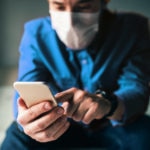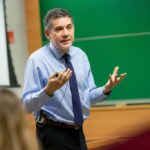Spanish scientists are researching the fake news phenomenon in the COVID-19 health crisis
The ‘RRSSalud’ project is researching the dynamics and types of fake news regarding coronavirus on social networks, thus helping to alleviate the negative effects of this health crisis. Coordinated by the researcher Ramón Salaverría, the initiative is part of the BBVA Foundation’s 2019 program to assist scientific research teams in economics and digital society. One of the first conclusions of the study has determined that one-third of current fake news stories refer to the health crisis contain health or scientific content.

Fake news represent a phenomenon of great interest to researchers due to its negative impact on society’s beliefs and opinions. Their study tends to be confined to political communication, public opinion, the corporate world or environmental issues, but in the current context, scientific research on fake news in the health field seems more necessary than ever.
Ramón Salaverría, Vice-Dean of Research at the University of Navarra’s Communication Department, together with two teams from the same university and one from the Barcelona Supercomputing Center, have accelerated the launch of their project, RRSSalud. It was created to investigate the dynamics and types of fake news on health issues posted on social networks in Spain. The project is currently focusing on analyzing all fake news related to coronavirus, thus helping to combat its negative effects during this health crisis.
Specifically, “In the period from March 14th to April 13th, we have used the misinformation linked to the pandemic identified by certified news fact-checking platforms in Spain as the foundation of our first analysis,” explains Salaverría. This has led the team to conclude that one third of fake news stories are related to health or scientific topics; another third of the fake news stories had to do with politics (but connected to the pandemic); and the final third was related to various topics, including everything from phishing scams to fake news on citizen security and the lockdown restrictions. Jokes or parodies, exaggerations, taking information out of context, or scams are the main types of fake news that were found.

Ramón Salaverría - Fernando Mucci
In addition to exploring the rhetorical topics, morphology and strategies of the fakes news on health, the project foresees evaluating Internet users’ ability to distinguish fake and true content. To do so, the multidisciplinary team of researchers in the social communication and digital journalism, public health and microbiology, and big data statistics fields has combined quantitative (statistical analysis of networks) and qualitative (content analysis and focus groups) methodologies.
A project to serve society
“The project has a social component, in addition to the scientific aspects,” notes Salaverría. The dissemination of the results from this research study and the drafting of a guide of best practices based on the research aims to be a source of practical knowledge for health authorities, the media and citizens - the main social actors in the spread of information on the pandemic.
Therefore, RRSSalud offers health authorities the keys to communicating appropriately and stopping the spread of malicious content. It also serves to guide the media on how the treat this type of information and to prevent the media from spreading fake news or treating it superficially or in a sensationalistic manner. And finally, it provides citizens a series of indicators to avoid believing and sharing fake news related to health.